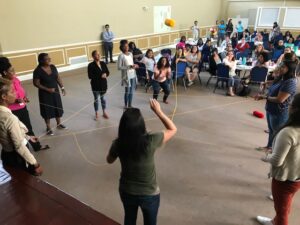
Can there be such a thing as protecting children too much? Do parents take responsibility for their children’s anxieties, failures, disappointments and frustrations more than they should? Do they intervene too quickly with what they perceive as unfair treatment of their children at the hands of teachers, coaches, and even neighbors?
Research in this area has resulted in a whole new vocabulary to describe them: “helicopter” parents who swoop in to alleviate any sign of discomfort in their children and “snow plow” or “lawnmower” parents who set out to clear the way for their children in order to keep them from facing any obstacles along the way.
Yes, indeed, no one should be a bigger advocate for children more than parents are, but it is the extent of involvement that determines how helpful it really is in the long run. Too much parental intervention actually keeps children from experiencing failure and disappointment and other unpleasant situations, and it sends the message that avoidance of such things is the best medicine. Similarly, failure is intolerable, when, in fact, it may indeed be a building block for later success. Children who rarely have to cope with failure and disappointment are those who are more likely to be anxious and unadventurous and less likely than others to takes risks and try out new experiences. Maybe children’s successes depend less on perfect performance and more on learning how to deal with failure; overcoming such challenges makes them less anxious and more resilient in the face of future obstacles. If parents take care of everything, especially their children’s experiences with anxiety, how will children ever learn to do so?
Professionals conclude that somewhere between 30 and 40 percent of anxiety is genetic, so some children will be more prone to it than others. However, parents play a significant role in how children manage their anxiety. They are not the cause of anxiety in their offspring, but they do accommodate it, making it more intense than it should be. That is, they do things to shield not only their children, but even themselves, from the discomfort they may see in their children: they drive them to school rather than have them walk or bicycle there; they allow them to sleep in their beds when they claim to be fearful of sleeping alone; they take great pains to avoid all contacts with dogs because they might frighten a son or daughter.
Of course, the current lockdown due to the coronavirus pandemic has ratcheted up the level of anxiety in many households. Media coverage of the virus and of other high profile cases of violence throughout the country undoubtedly fuels a considerable amount of anxiety in parents, thus their wish to do many things to keep their children as safe and as stress-free as possible. Reports of school shootings and of child abductions, among other events, claim the front pages of newspapers and of all forms of media for days and days. As horrific as these isolated events are, they are extremely rare, yet some parents get the message loud and clear: this, too, can happen to your child, so take precautions!
Parents can use instances of anxiety in children as teachable moments. First, parents should start with managing their own anxiety related to their children and not resonate with their tears and fears, otherwise such fearful reactions will just be reinforced and strengthened in their children. In fact, some anxiety is useful and adaptive, and it should be expected from time to time; it alerts everyone to the fact that they should be ready to cope with something on the horizon. If they weren’t stressed out about an upcoming school exam, for example, they wouldn’t take the time or effort to study for it.
Listening to children and understanding how they perceive those particular situations or events that trouble them, empathizing with their feelings and letting them know that you “feel their pain” comes next. Then suggest that maybe that troubling feeling is just a problem to be solved and not an overwhelming catastrophe. Rather than having children use avoidance as a coping mechanism, introduce those troubling items in small, incremental steps.
Ask questions: what are some of the things you can try to do to help with your worries? They may not be able to control the outcome, but they certainly can control the effort they put into it. What does this anxiety mean to them? Do they feel doomed for the foreseeable future because of it? What could be done differently the next time something like this happens? What level of control can they exert? The answers to these questions can guide parents in helping their children take charge of those issues that may trouble them.
Joseph E. Colford, Ph.D., NJ Licensed Psychologist
Professor Emeritus, Georgian Court University




